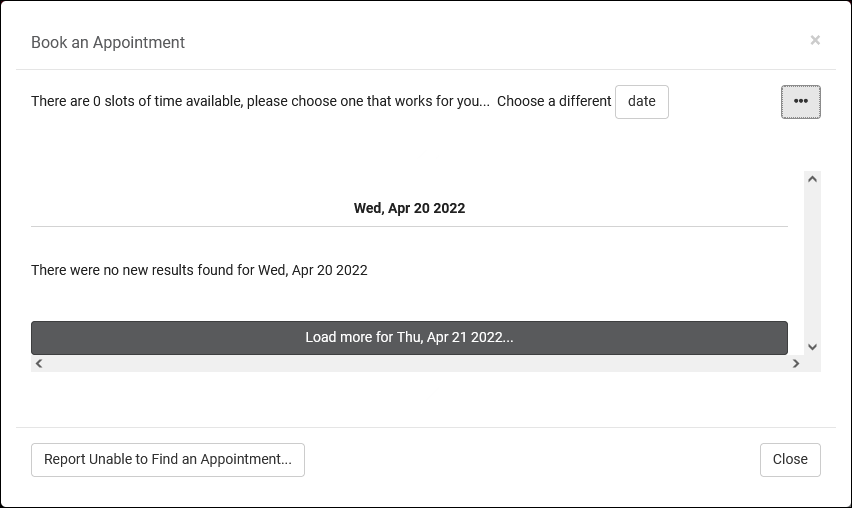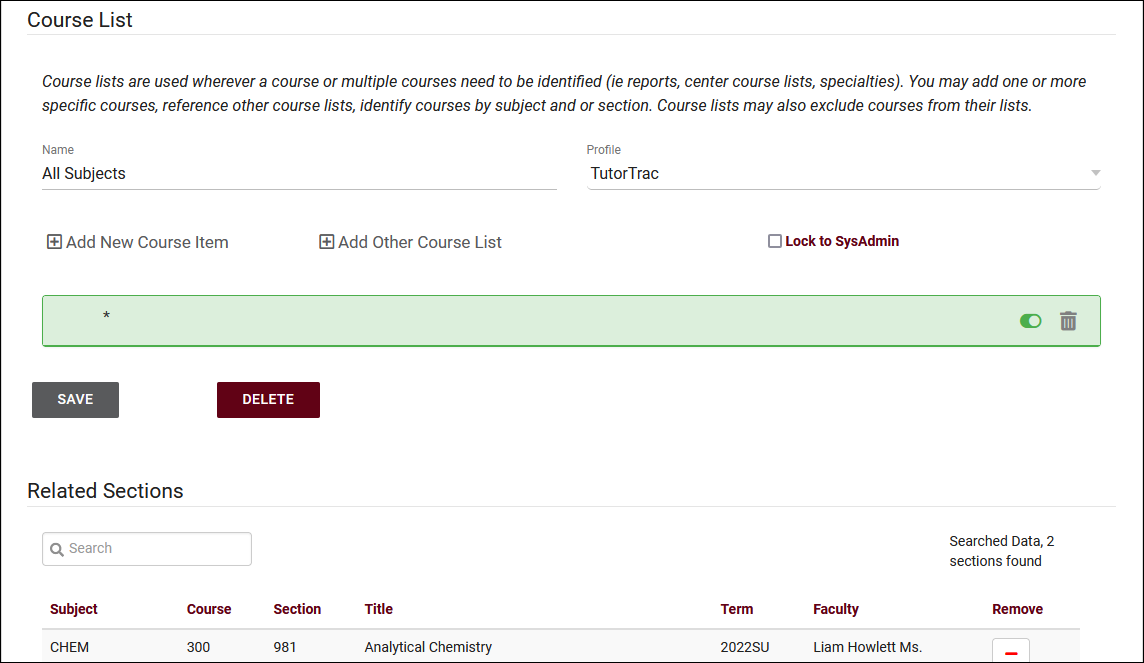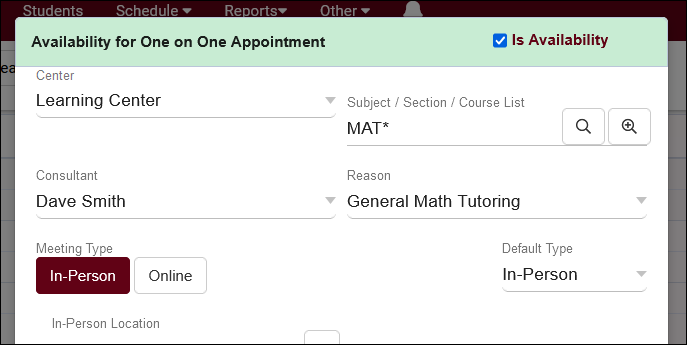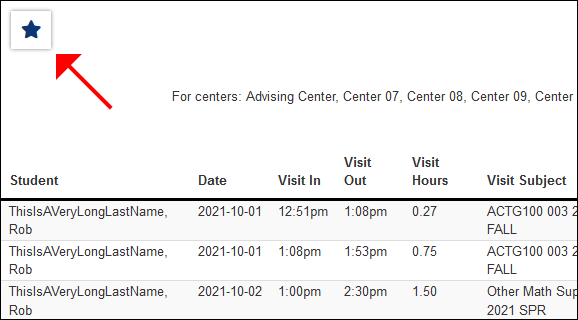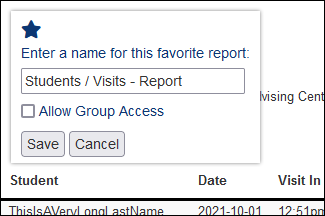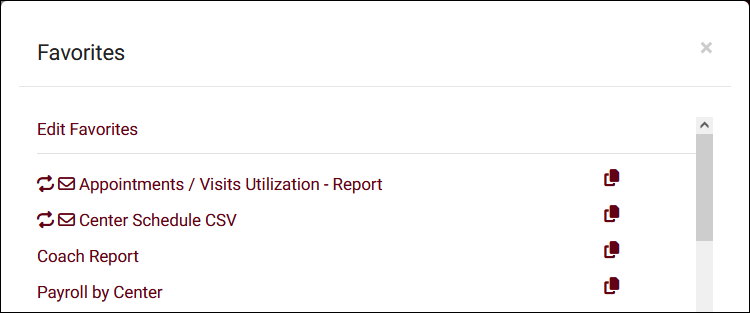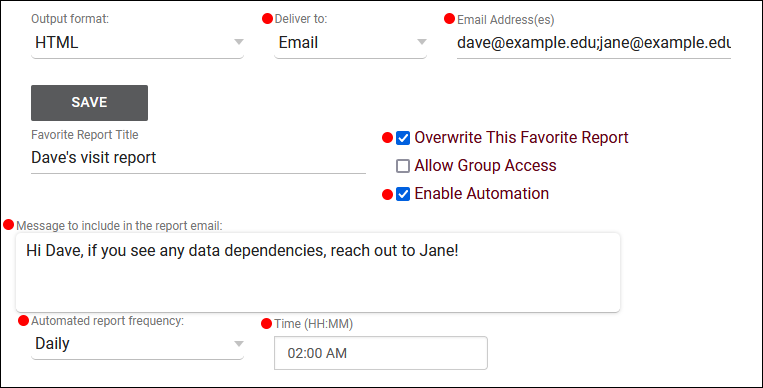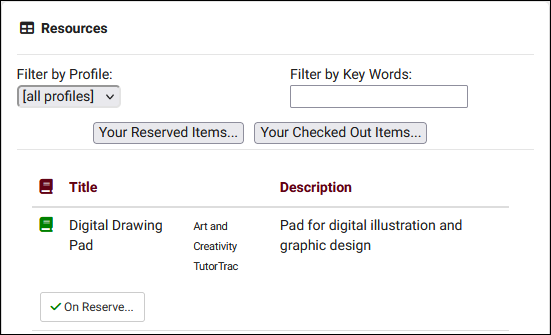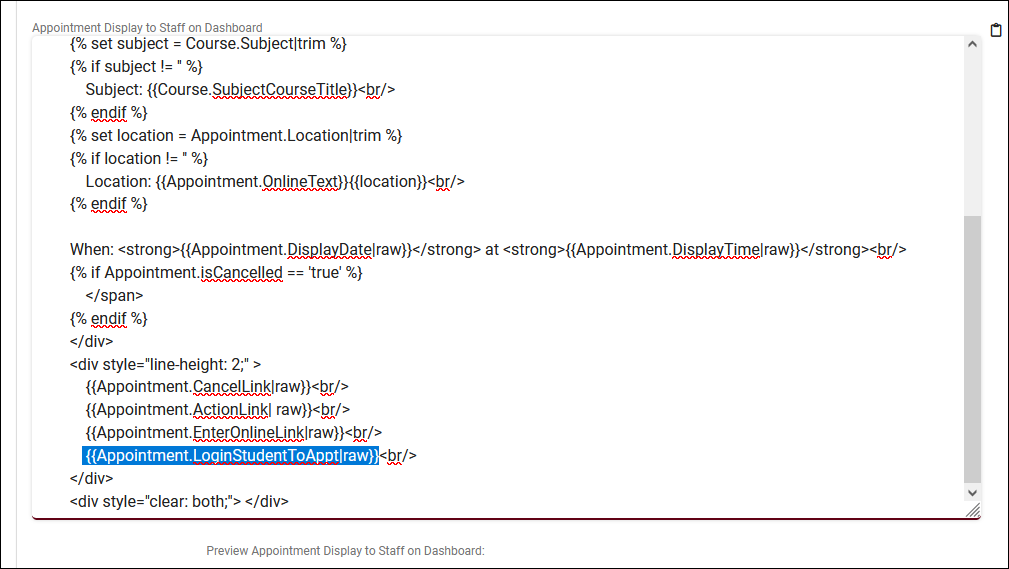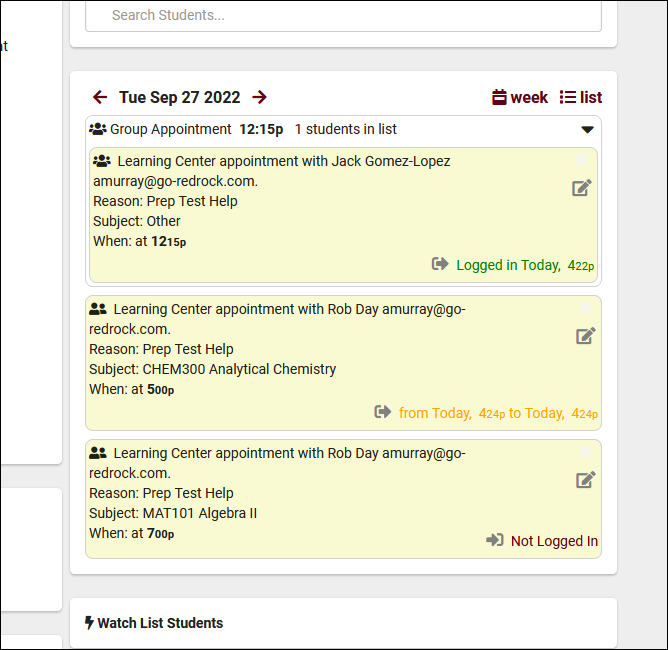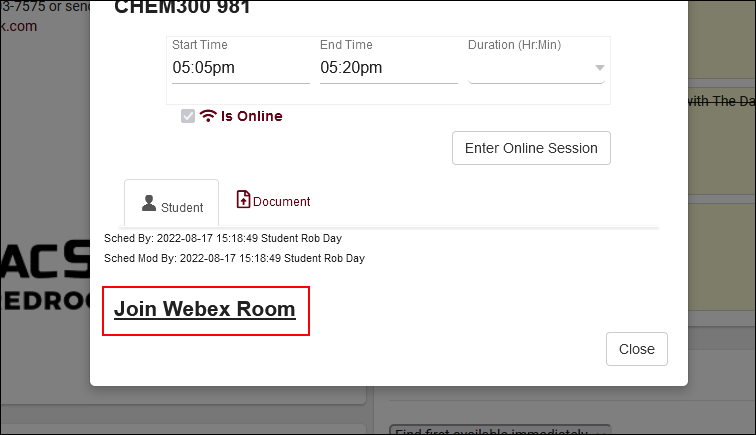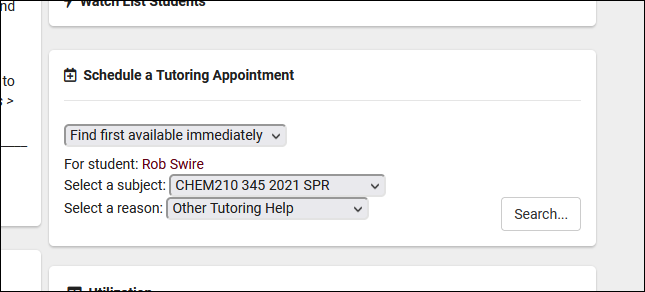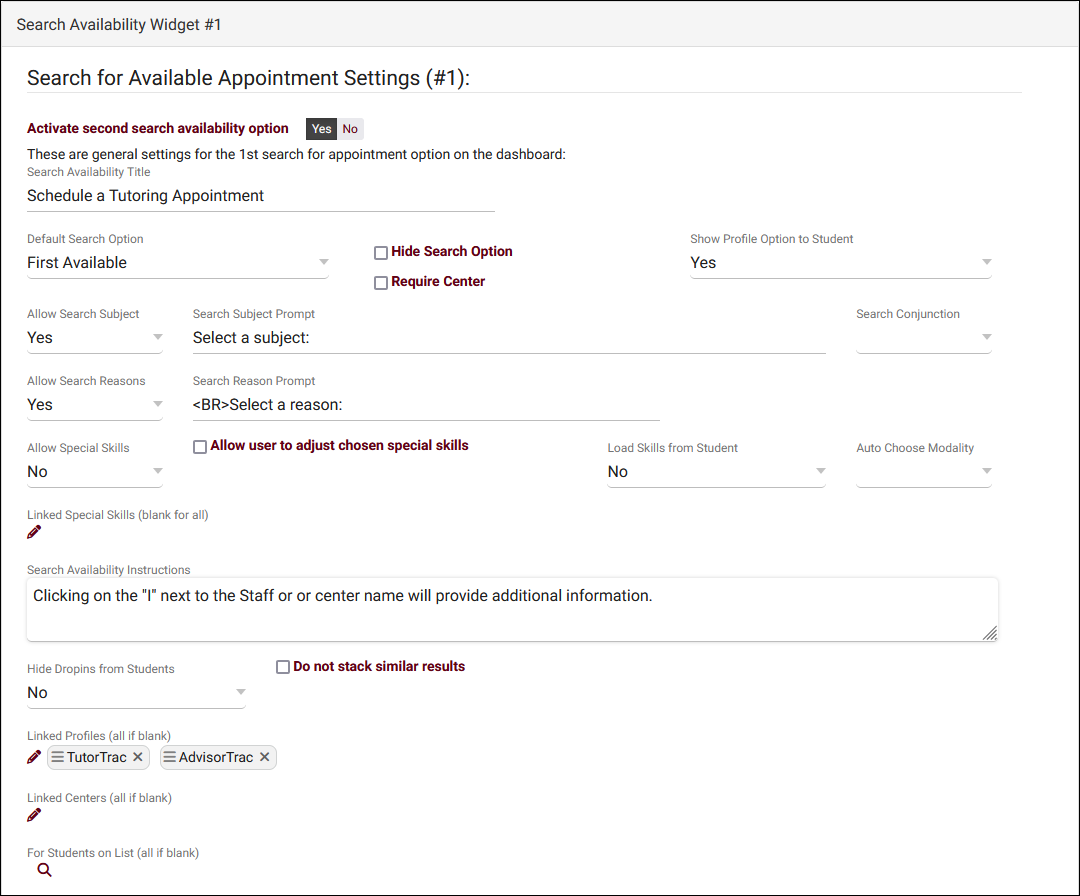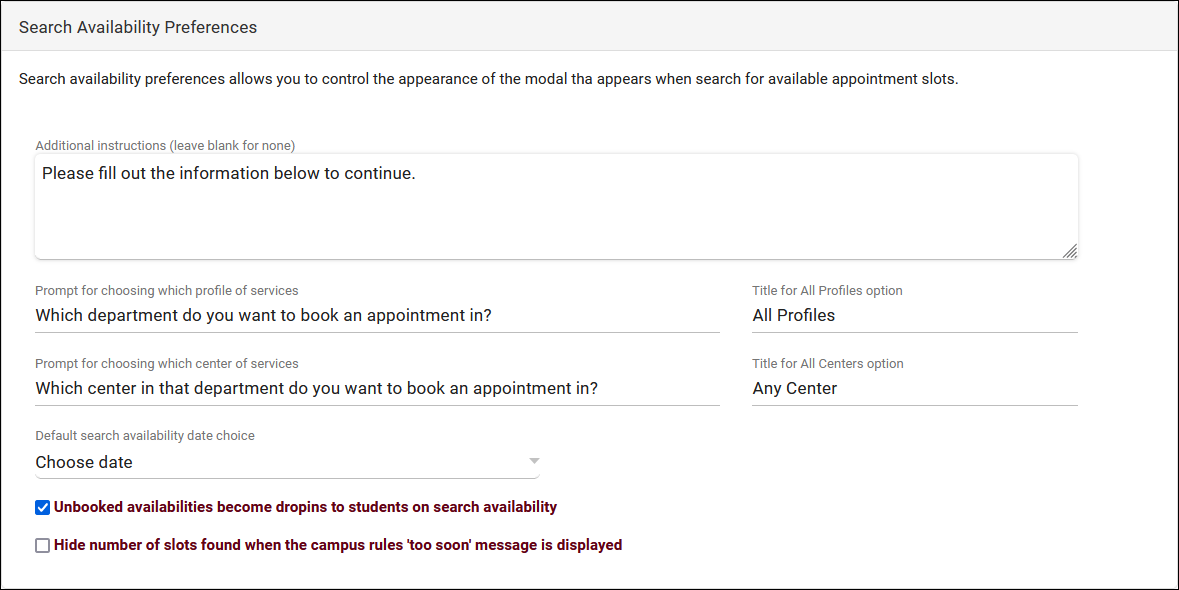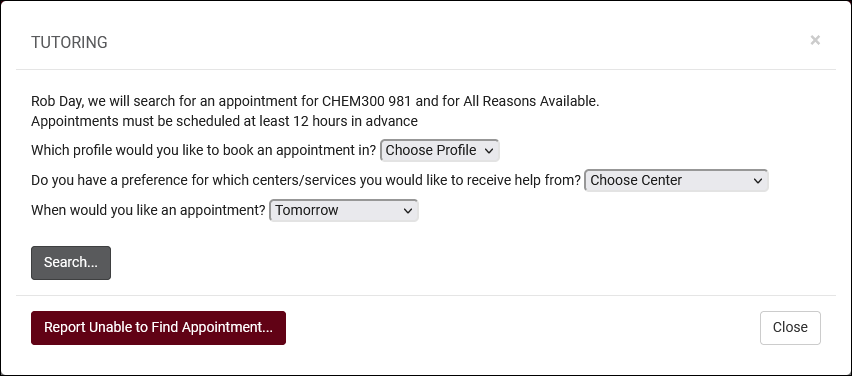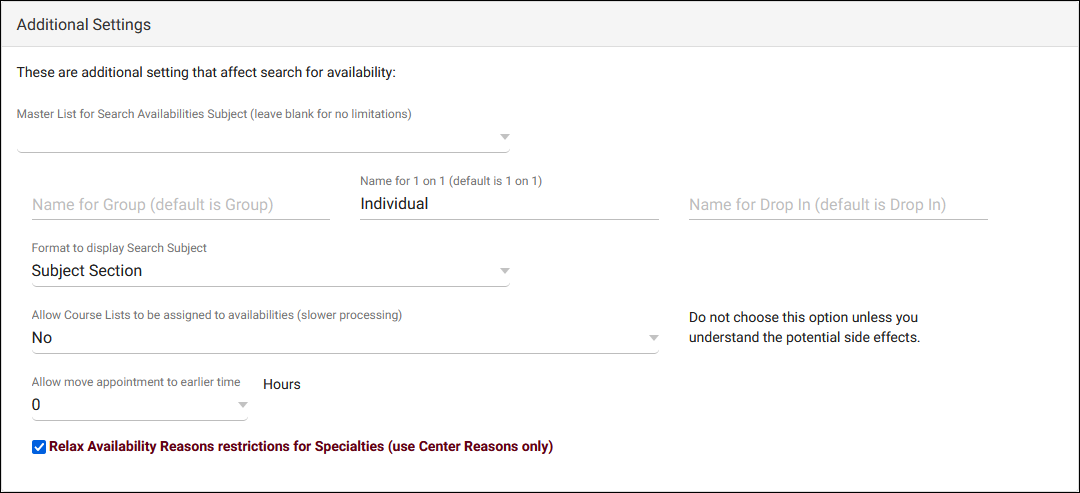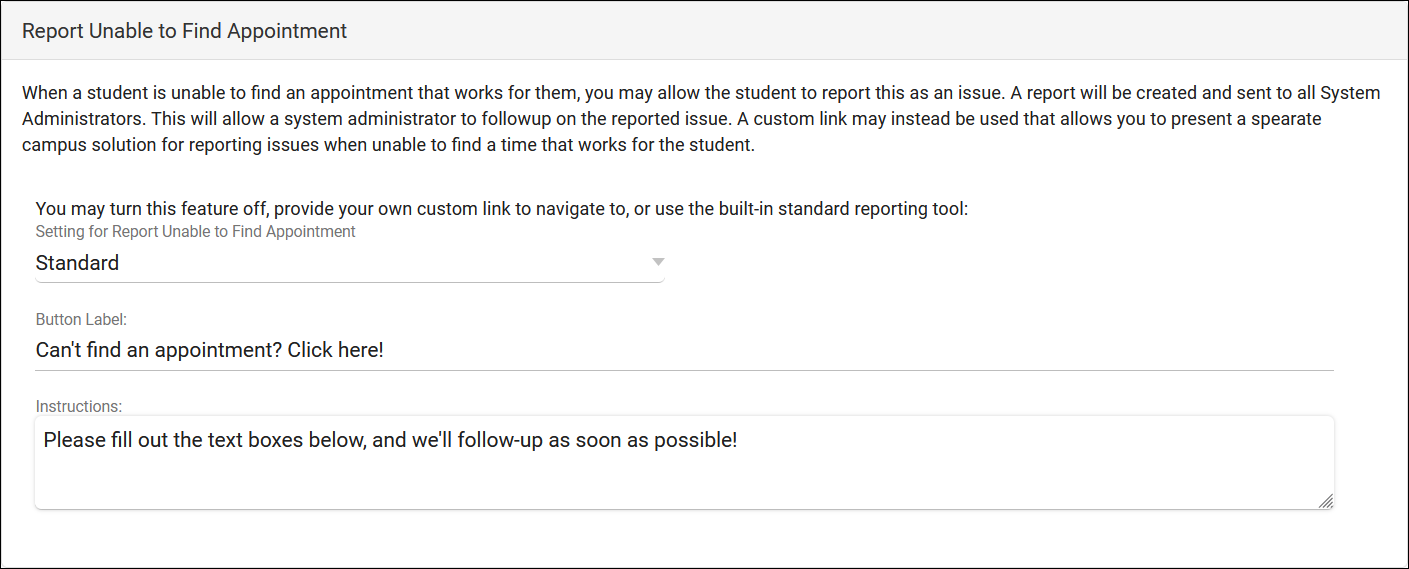TracCloudWhatsNew
From Redrock Wiki
This page highlights some of the recent changes made to the TracCloud platform, and how you can utilize them on your own instance. A list of past changes and a full changelog can be found in the tabs above.
If you have any questions about these changes, feel free to reach out to us on our helpdesk.
If you've created a new availability for one of your Consultants and it's not showing up as expected when performing a search for appointment times, there are a few possible causes. This portion of the wiki outlines these possibilities, ordered from most to least likely based on what we at Redrock have experienced working with campuses directly.
1. Center and Consultant Course Lists
The most common cause when an availability isn't appearing in search results is misconfigured Course Lists. Both your Consultant and your Center need to be assigned to the subject you're searching for (unless your Center or Reason is set to ignore Consultant Specialties). Make sure you Process Specialties (Step 2) after applying any changes.
Consultant Course List: Other > Listings > Staff > [Your Staff] > Course List of Specialties
Center Course List: Other > Other Options > Profiles > [Your Profile] > Centers > Course List for this Center
A complete list of Course Lists can also be found by simply going to: Other > Listings > Course Lists
2. Process Specialties
This is always recommended after applying changes to Course Lists, but it may also be the case that the specific section you searched for was imported after you created the Course List for your Center/Consultant, and a Course List refresh alone may resolve this issue. We can setup an automated process to Process Specialties daily if this occurs often, reach out to us using the 'Support' tab above for more information.
3. Reason Assignments
Similar to ensuring that your courses are assigned to the correct Consultant and Center, the same applies for Reasons. This step only applies if you're using Reason as a search criteria.
For Consultants, go to Other > Listings > Staff > [Your Staff] > Reason Specialties
For Centers, go to Other > Other Options > Profiles > [Your Profile] > Centers > [Your Center] > Active Reasons
4. Availability Subject/Reason
If your availability is assigned to the wrong subject or reason, this can cause it to be unintentionally filtered out of results. Make sure the value entered here is correct, especially if you're using wildcards. If these are blank (i.e., available for all specialties), you can skip this troubleshooting step.
Schedule > [Consultant] > Availability
5. Profile Time Restrictions
If your availability is 60 minutes long, but your profile only allows for a maximum of 50-minute appointments, this can unexpectedly filter out availabilities if you haven't updated your profile preferences to match this new limit. The relevant options to check here are Schedule no sooner than and no later than, ensure that you're searching within an allowed range. As well as Minimum and Maximum Appointment Duration, make sure your availability is within the limits defined by your profile.
Other > Other Options > Profiles > [Your Profile] > Prefs > Scheduling > Time Restrictions
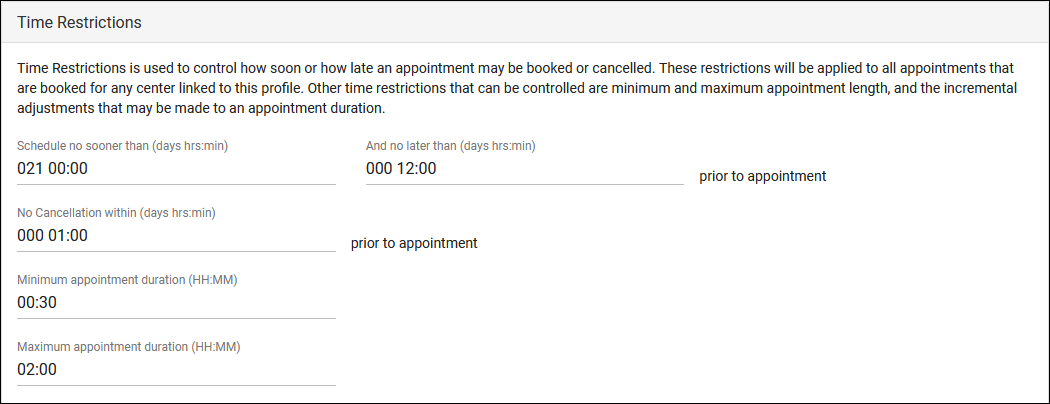
More Scheduling Prefs Information
6. Reason/Subject Required for Search
In the event that you aren't searching for both Reason and Subject, and the previous steps haven't resolved your issue, it's worth double-checking to make sure your Profile hasn't been mistakenly set to require a Subject/Reason to show availabilities. Make sure the highlighted settings match the search you're performing on the dashboard.
Other > Other Options > Profiles > [Your Profile] > Prefs > Scheduling > Special Fields
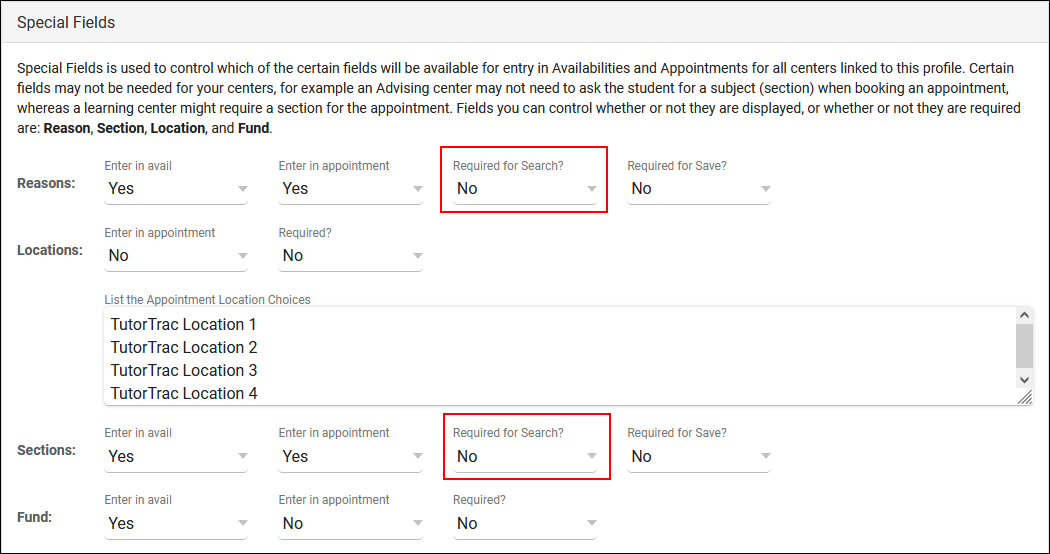
More Scheduling Prefs Information
7. Skills and Accommodations
If your campus utilizes the Skills/Accommodations feature, with 'Excluded when not chosen' enabled, make sure your consultant/availability is assigned to that Skill/Accommodation.
Consultants: Other > Listings > Staff > [Staff Account] > Special Needs/Skills/Accommodations
Availabilities: Schedule > [Availability] > Special Needs > Special Needs/Skills/Accommodations
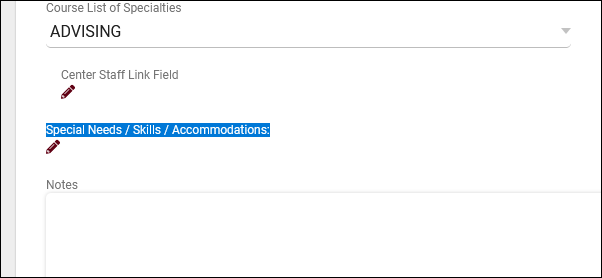
This portion of our wiki covers the individual reports available in the system, with descriptions and example screenshots showing what you can expect when you run the report on your own data. The list below on the left contains links to all of our available reports. You can also click the report category in the tabs above to begin.
If you have a question about any of these reports, feel free to reach out to us at helpdesk@go-redrock.com or by submitting a ticket.
Management
• Appointments by Assigned Advisor and Student
• Consultant Non-Duplicated Visit Time
• Logins by Hour by Day of Week
• Students Visits Cleanup Data
Scheduling
• Appointment Slot Utilization Date Comparison
• Appointments/Availabilities by Hour by Day of Week
• Appointments/Visits Utilization
• Consultant Max Hours and Non-Duplicated Appointment Time
Students
• Appointments by Hour by Day of Week
• Student Search Availabilities
• Students Visits/Appointments by ??
• Students and Appointment Status Crosstab
• Students by Appointment Status
Career Center
Q2 Tables
Retention
SAGE
• Referrals by Student and Appointments/Visits
SurveyTrac
• Survey Response Rate Comparison
• Unanswered Staff/Faculty Surveys
Success Plans
Work Plans
Workshops
Saving a Report as a Favorite
Find a report that you plan on coming back to? Save it as a favorite for quick access later. From the report results window itself, click the star icon in the top-left corner, choose a name for your favorite, and click save.
- Allow Group Access will make this report visible to other staff members in your Permission Group.
This report can then be found from your dashboard under Reports > Favorites at any time. The button can be used to duplicate the favorite report.
Automating a Favorite Report
After saving your report as a favorite, you can automate it to run on a set schedule and be emailed to you or a group of users.
Start by going to Reports > Favorites > Edit Favorites. This will bring you to the following screen. Click on the Pencil icon of the report you want to automate.
- Deliver to: should be set to Email in this case.
- Email Address(es) is where you'll add your recipients' email addresses. Multiple addresses can be entered, delimited by a semicolon.
- Enable Automation will enable automation and make the following options available.
- Message to include in the report email will add in some custom messaging to your emailed report.
- Automated report frequency. Do you want this report to run daily, weekly, monthly, or once on a specific date?
- Time will determine the time that this report will run on your scheduled frequency.
- Overwrite This Favorite Report will overwrite your existing report settings with your new automation rules.
Click save to apply your changes.
Reports Management
This utility (found in Other > Other Options > Preferences > Reports Management) allows you to manage and reassign Favorite reports. This can be used if you want to create a report for someone else or to recover existing favorite reports from inactive (or even deleted) accounts. Within this menu, you'll find the name of the report, the current owner, and a icon to delete the report. The owner drop-down will allow you to change ownership to another staff member. Changes are saved immediately.
Any favorite report belonging to the currently-logged-in sysadmin or an account without a known permission group (i.e., deleted accounts) can be reassigned to any active staff. Favorite reports belonging to staff as well as group favorite reports belonging to deleted staff can only be assigned to those also in the permission group of the original staff account.
In any case, reassigning favorite reports does not bypass report security in TracCloud. For example, it's not possible to give a regular staff account access to payroll reports by reassigning a payroll report to them in this menu. Reassigning ownership of a favorite report also does not change group access. Further modifications to the report must be made by editing the favorite report from the new owner's account.
- Email reports with the report file attached in a single email
- Rather than sending emailed reports as a link and a passcode in two separate emails, enabling this will instead send emailed reports as an attachment. This setting will be ignored if a generated report is greater than 10MB.
Search Operators
When using the 'Additional Search' utility in your report settings, you have additional operators available to better narrow down your results. Operators can be combined as needed to perform a more specific search.
- | ('or' operator; search for multiple unique values)
- * (wildcard; anything that starts with/ends with/contains a specified string)
- # ('not' operator; exclude results that match this search)
- && ('and' operator; typically used alongside 'not' to exclude multiple items at once)
- blankornull (this keyword specifically finds records where the chosen field is blank)
This portion of our wiki covers the individual reports available in the system, with descriptions and example screenshots showing what you can expect when you run the report on your own data. The list below on the left contains links to all of our available reports. You can also click the report category in the tabs above to begin.
If you have a question about any of these reports, feel free to reach out to us at helpdesk@go-redrock.com or by submitting a ticket.
Management
• Appointments by Assigned Advisor and Student
• Consultant Non-Duplicated Visit Time
• Logins by Hour by Day of Week
• Students Visits Cleanup Data
Scheduling
• Appointment Slot Utilization Date Comparison
• Appointments/Availabilities by Hour by Day of Week
• Appointments/Visits Utilization
• Consultant Max Hours and Non-Duplicated Appointment Time
Students
• Appointments by Hour by Day of Week
• Student Search Availabilities
• Students Visits/Appointments by ??
• Students and Appointment Status Crosstab
• Students by Appointment Status
Career Center
Q2 Tables
Retention
SAGE
• Referrals by Student and Appointments/Visits
SurveyTrac
• Survey Response Rate Comparison
• Unanswered Staff/Faculty Surveys
Success Plans
Work Plans
Workshops
Saving a Report as a Favorite
Find a report that you plan on coming back to? Save it as a favorite for quick access later. From the report results window itself, click the star icon in the top-left corner, choose a name for your favorite, and click save.
- Allow Group Access will make this report visible to other staff members in your Permission Group.
This report can then be found from your dashboard under Reports > Favorites at any time. The button can be used to duplicate the favorite report.
Automating a Favorite Report
After saving your report as a favorite, you can automate it to run on a set schedule and be emailed to you or a group of users.
Start by going to Reports > Favorites > Edit Favorites. This will bring you to the following screen. Click on the Pencil icon of the report you want to automate.
- Deliver to: should be set to Email in this case.
- Email Address(es) is where you'll add your recipients' email addresses. Multiple addresses can be entered, delimited by a semicolon.
- Enable Automation will enable automation and make the following options available.
- Message to include in the report email will add in some custom messaging to your emailed report.
- Automated report frequency. Do you want this report to run daily, weekly, monthly, or once on a specific date?
- Time will determine the time that this report will run on your scheduled frequency.
- Overwrite This Favorite Report will overwrite your existing report settings with your new automation rules.
Click save to apply your changes.
Reports Management
This utility (found in Other > Other Options > Preferences > Reports Management) allows you to manage and reassign Favorite reports. This can be used if you want to create a report for someone else or to recover existing favorite reports from inactive (or even deleted) accounts. Within this menu, you'll find the name of the report, the current owner, and a icon to delete the report. The owner drop-down will allow you to change ownership to another staff member. Changes are saved immediately.
Any favorite report belonging to the currently-logged-in sysadmin or an account without a known permission group (i.e., deleted accounts) can be reassigned to any active staff. Favorite reports belonging to staff as well as group favorite reports belonging to deleted staff can only be assigned to those also in the permission group of the original staff account.
In any case, reassigning favorite reports does not bypass report security in TracCloud. For example, it's not possible to give a regular staff account access to payroll reports by reassigning a payroll report to them in this menu. Reassigning ownership of a favorite report also does not change group access. Further modifications to the report must be made by editing the favorite report from the new owner's account.
- Email reports with the report file attached in a single email
- Rather than sending emailed reports as a link and a passcode in two separate emails, enabling this will instead send emailed reports as an attachment. This setting will be ignored if a generated report is greater than 10MB.
Search Operators
When using the 'Additional Search' utility in your report settings, you have additional operators available to better narrow down your results. Operators can be combined as needed to perform a more specific search.
- | ('or' operator; search for multiple unique values)
- * (wildcard; anything that starts with/ends with/contains a specified string)
- # ('not' operator; exclude results that match this search)
- && ('and' operator; typically used alongside 'not' to exclude multiple items at once)
- blankornull (this keyword specifically finds records where the chosen field is blank)
- Choose to Block Students on List
- Show resources widget on the student dashboard
- Allow students to reserve a resource via the dashboard
- Expands the above functionality to allow students to reserve resources for themselves.
- Expands the above functionality to allow students to reserve resources for themselves.
- Maximum # outstanding reservations overall
- How many total outstanding reservations can a student hold for your resources?
- How many total outstanding reservations can a student hold for your resources?
- Maximum # outstanding reservations for one resource
- How many total outstanding reservations can a student hold for a single resource?
- How many total outstanding reservations can a student hold for a single resource?
- Maximum # of days for an individual reservation
- How many days can a student reserve a resource for? For example, allowing the student to reserve the resource from the 11th of the month to the 17th, but no longer, would mean this preference needs to be set to 7.
- How many days can a student reserve a resource for? For example, allowing the student to reserve the resource from the 11th of the month to the 17th, but no longer, would mean this preference needs to be set to 7.
- Minimum time needed (days hrs:min) prior to reservation
- Choose the minimum amount of time in advance needed in order to reserve a resource. This is to prevent students from reserving items in the very near future.
- Choose the minimum amount of time in advance needed in order to reserve a resource. This is to prevent students from reserving items in the very near future.
Profile Preferences
Prefs
Both students and consultants will see upcoming appointments on their dashboard, and staff will see them from the schedule view. The formatting of these appointment info boxes can be customized in your profile settings, allowing you to provide the necessary information in a visually appealing format.
Student View
Students will be able to view their upcoming appointments on the right-side of the dashboard. The fields visible and the format they're in is entirely customizable by modifying the Appointment Display preference.
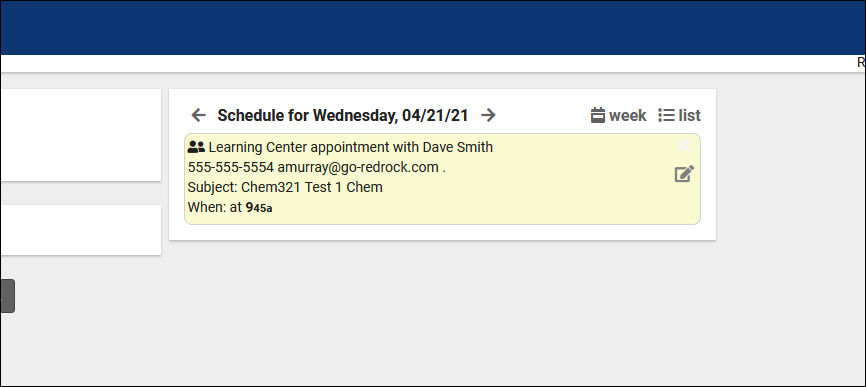
Consultant View
Consultants have a similar view to students, which can be modified independently.
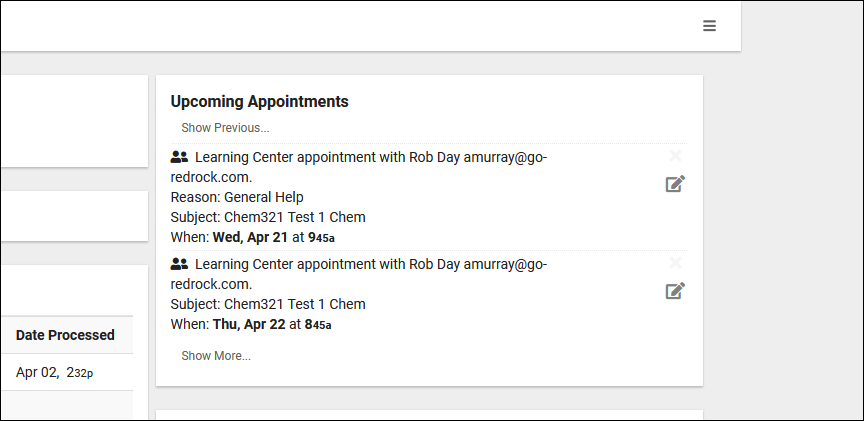
Schedule View
Lastly, the staff schedule view, which allows us to view and manage our consultants’ availabilities and upcoming appointments. The appointment text is also customizable.
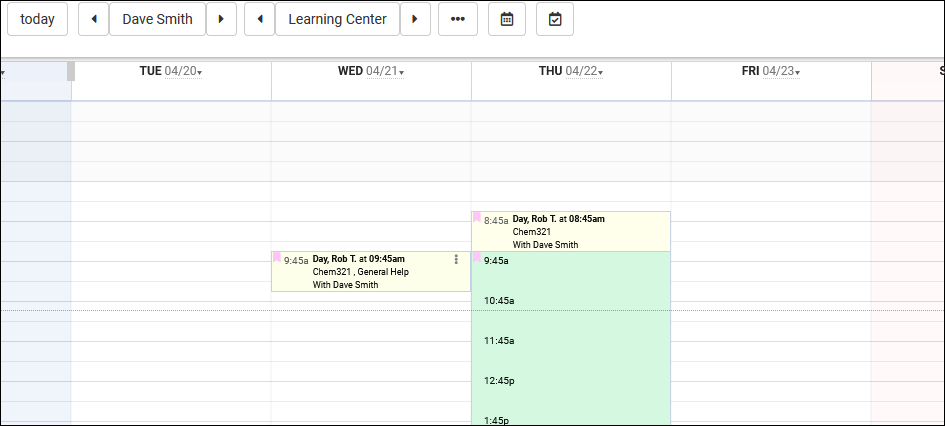
Customization
Within the Appointment Display menu, you will see a text box available for Students, Staff, and the Schedule view for Staff. There's also a preview section beneath each text box allowing you to easily see how your changes will display.
These text boxes support HTML and Twig. HTML support is standard, allowing you to easily make text <b>bold</b>, <i>italic</i>, or <u>underlined</u>, or add hyperlinks. Twig on the other hand allows you to pull data from TracCloud into the message, as well as include logic that determines whether or not a portion text is included. For information on Twig, please take a look at our dedicated Twig article here.
The "Appointment Display to Staff on Schedule" field in particular has a unique Twig tag available for use: {{Appointment.SchedVisitStatusIcon|raw}} which will add a button to start and conclude a visit for that appointment directly on the appointment itself.
Other > Other Options > Profiles > [Your Profile] > Prefs > Scheduling > Appointment Display
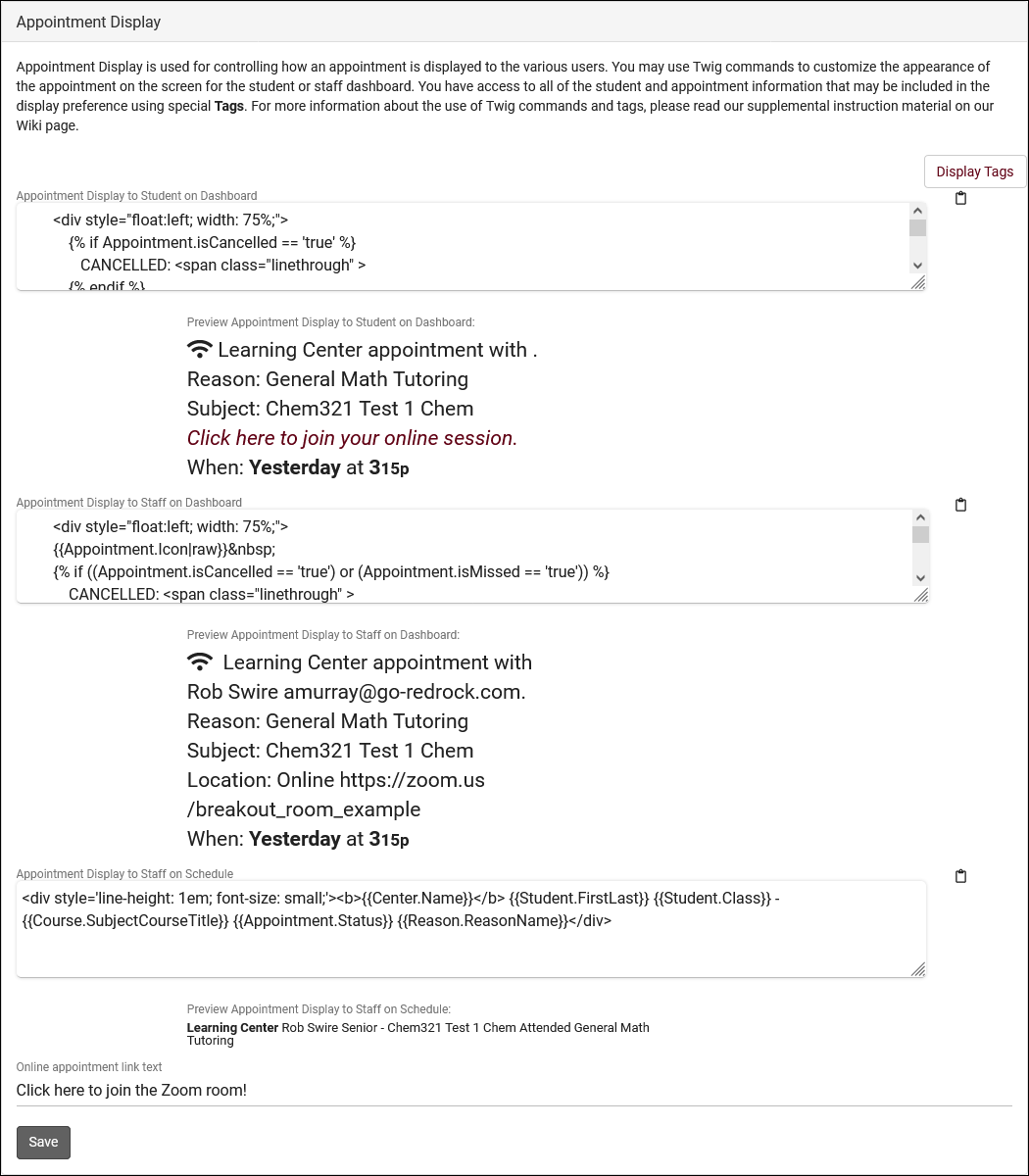
If you want to reset to the default configuration, simply click on the clipboard icon on the right, which will confirm if you want to erase the existing configuration in favor of the standard one.
Here are a couple examples of how you can configure the schedule and upcoming appointment views. This is more-so to give you an idea of how this feature works rather than a direct suggestion of what to use (although you’re welcome to copy these as-is if you’d like). Hopefully this gives you an idea of how the feature can be used, and how you can configure it on your own system.
Schedule View
Here’s a configuration that provides basic information about the appointment. The student’s name and appointment time in bold lettering, the subject and reason, and the consultant’s name. The if statement checks if the appointment has a Reason, and if it does, include a comma after the subject then print the reason.

<div style="float:left; width: 75%;">
<p style="font-size:9px">
<b>{{Student.Full_Name}}</b> at <b>{{Appointment.StartTime}}</b><br>
{{Course.SubjectCourse}}
{% if Reason.ReasonName != "" %}
, {{Reason.ReasonName}}
{% endif %}
<br>With {{Consultant.FirstLast}}
</p></div>
Student View
Here’s an example student view configuration. This one reads more like a spoken paragraph, with the important information bolded. Whether the appointment is in-person or online determines the text in the second half.
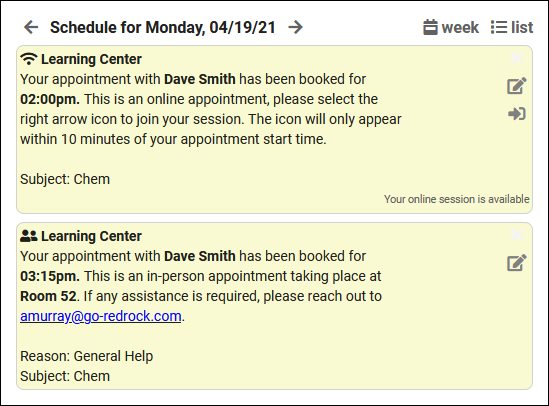
<div style="float:left; width: 75%;">
{{Appointment.Icon|raw}}
<b>{{Center.Name}}</b><br>
Your appointment with <b>{{Consultant.NameToStudent}}</b> has
been booked for <b> {{Appointment.StartTime}}. </b><br>
{% if Appointment.Online == "1" %}
This is an online appointment, please select the right arrow icon to join your session.
The icon will only appear within 10 minutes of your appointment start time.
{% else %}
This is an in-person appointment taking place at <b>{{Appointment.Location}}</b>.
If any assistance is required, please reach out to <u>{{Consultant.Email}}</u>.
{% endif %}<br>
{% if Reason.ReasonName != '' %}
Reason: {{Reason.ReasonName}}<br/>
{% endif %}
{% if Course.Subject != '' %}
Subject: {{Course.Subject}}<br/>
{% endif %}<br>
</div>
<div style="line-height: 2;" >
{{Appointment.CancelLink|raw}}<br/>
{{Appointment.ActionLink|raw}}<br/>
{{Appointment.EnterOnlineLink|raw}}<br/>
</div>
<div style="clear: both;"> </div>
Consultant View
This one has a few more moving parts. Near the top, we’re saying “if the appointment has been cancelled, say “CANCELLED:” and strikethrough the rest of the contents.” We also have a series of “if this field isn’t blank, include it in the list” as well as the time saying the word “Today” rather than a standard date and time.
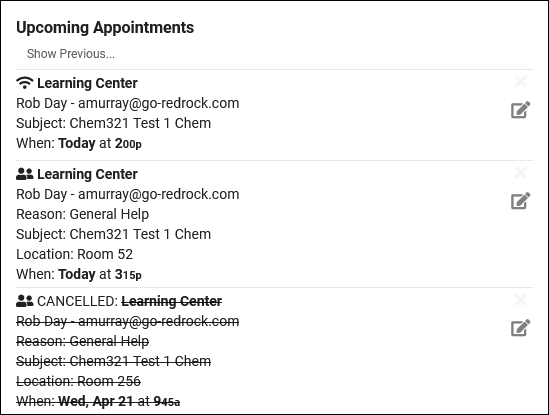
<div style="float:left; width: 75%;">
{{Appointment.Icon|raw}}<br>
{% if Appointment.isCancelled == 'true' %}
CANCELLED: <span class="linethrough" >
{% endif %}<br>
<b>{{Center.Name}}</b>
<span title="{{Student.ID}}">{{Student.FirstLast}}</span> - {{Student.Email}}<br>
{% if Reason.ReasonName != '' %}
Reason: {{Reason.ReasonName}}<br/>
{% endif %}
{% if Course.Subject != '' %}
Subject: {{Course.SubjectCourseTitle}}<br/>
{% endif %}
{% if Appointment.Location != '' %}
Location: {{Appointment.OnlineText}}{{Appointment.Location}}<br/>
{% endif %}<br>
When: <strong>{{Appointment.DisplayDate|raw}}</strong> at
<strong>{{Appointment.DisplayTime|raw}}</strong><br/><br>
{% if Appointment.isCancelled == 'true' %}
</span>
{% endif %}<br>
</div>
<div style="line-height: 2;" >
{{Appointment.CancelLink|raw}}<br/>
{{Appointment.ActionLink| raw}}<br/>
{{Appointment.EnterOnlineLink|raw}}<br/>
</div>
<div style="clear: both;"> </div>
A unique option available in the consultant view is the ability to start and stop a visit directly from the dashboard. This can be implemented by including the {{Appointment.LoginStudentToAppt|raw}} Twig tag in your appointment display configuration. It will display as a clickable button to your staff.
- Online appointment link text
- Cancel/Edit/Enter session button
- Allows you to override the format of these buttons on the appointment display. For example, the following cancel button would have the effect shown in the screenshot below.
- <i style="border: 2px solid red; background-color: lightgrey; color: black; border-radius: 5px; padding: 2%; margin: 1%">Cancel</i>

See Also
2022-08-09 | Availabilities that aren't booked can now become drop-ins automatically
A new System Preference has been added (Other > Other Options > Preferences > Search Availability Options > Unbooked availabilities become dropins to students on search availability). If this is enabled, any in-person availabilities that remain unbooked by the time your "schedule no sooner than" limit is reached will automatically become drop-ins for students.
As an example, this test system doesn't allow students to book appointments within an hour of the session starting. At more than an hour out, it appears normally.

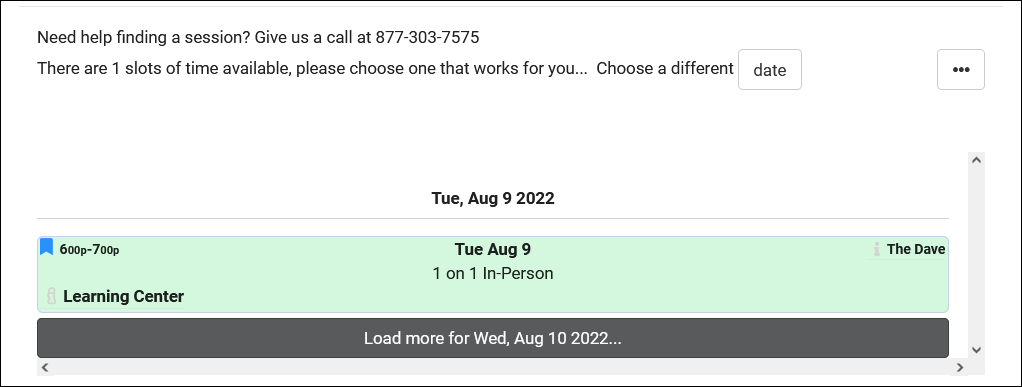
However, once we pass our 1-hour example threshold, the availability on the staff schedule looks normal, but students will now see this time as an available in-person drop-in session.


These preferences allow you to modify the behavior of the Search Availability widget on the dashboard. There are 3 sets of settings by default, as you can have up to 3 Search Availability widgets at once. For example, if you had an AdvisorTrac and a TutorTrac profile in the same instance, you may want reason to be a required search criteria for Advising, but only require Subject for Tutoring. These options allow you to offer a separate widget for each profile. If your campus needs more than 3 widgets, this can be added at an additional cost. Reach out to sales@go-redrock.com for more information.
- Activate primary/secondary/tertiary search availability option
- This allows you to enable additional search widgets when needed. The primary option is enabled by default.
- This allows you to enable additional search widgets when needed. The primary option is enabled by default.
- Search Availability Title
- This allows you to modify the name of the Search Availability widget on the dashboard. Also displays within the header of the subsequent search results page.
- This allows you to modify the name of the Search Availability widget on the dashboard. Also displays within the header of the subsequent search results page.
- Default Search Option
- This determines whether the Schedule an Appointment dashboard utility defaults to “First Available” or “Choose Date.” The latter will prompt staff and students to select a Profile, Center, and Date Range for their search results. Hide Search Option will hide this choice, preventing users from using anything but the default. Require Center can be enabled to require a center be selected in the "Choose Date" menu.
- This determines whether the Schedule an Appointment dashboard utility defaults to “First Available” or “Choose Date.” The latter will prompt staff and students to select a Profile, Center, and Date Range for their search results. Hide Search Option will hide this choice, preventing users from using anything but the default. Require Center can be enabled to require a center be selected in the "Choose Date" menu.
- Show Profile Option to Student
- When “Choose Date” Is used when searching for availabilities, the user is asked which Profile and Center they want to search in. This option provides the ability to disable the Profile choice for students.
- When “Choose Date” Is used when searching for availabilities, the user is asked which Profile and Center they want to search in. This option provides the ability to disable the Profile choice for students.
- Show Search Center on Widget
- If enabled, a center choice will be shown above the subject/reason menus on the search availability widget. The Require Center option also applies to this if you want to require users select a center to search for availabilities.
- If enabled, a center choice will be shown above the subject/reason menus on the search availability widget. The Require Center option also applies to this if you want to require users select a center to search for availabilities.
- Show Search Consultant on Widget
- If enabled, a consultant choice will be shown below the subject/reason menus on the search widget. Show Search Center on Widget must be enabled first.
- If enabled, a consultant choice will be shown below the subject/reason menus on the search widget. Show Search Center on Widget must be enabled first.
- Show Search Location on Widget
- If enabled, a location choice will be shown above the subject/reason menus on the search widget. Show Search Center on Widget must be enabled first.
- If enabled, a location choice will be shown above the subject/reason menus on the search widget. Show Search Center on Widget must be enabled first.
- Allow Search Subject/Reasons
- Allows you to disable the Subject or Reason search options within the Schedule an Appointment utility.
- Allows you to disable the Subject or Reason search options within the Schedule an Appointment utility.
- Search Subject/Reason Prompt
- Allows you to modify the phrasing of these drop-down fields in the Search Availability box on the dashboard. Search Conjunction determines whether the two fields are separated by an And or an Or.
- Allows you to modify the phrasing of these drop-down fields in the Search Availability box on the dashboard. Search Conjunction determines whether the two fields are separated by an And or an Or.
- Allow Special Skills
- If enabled, students/staff will see the skills and accommodations search field when searching for availabilities. This should be enabled if using this functionality.
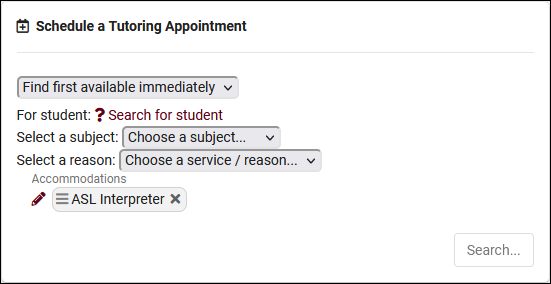
- Linked Special Skills
- This allows you to restrict which skills/accommodations are available in this widget. Default is blank (all).
- This allows you to restrict which skills/accommodations are available in this widget. Default is blank (all).
- Allow user to adjust chosen special skills
- If checked, users can specify which skills/accommodations they want to search for. If unchecked, all available special skills will be chosen (as determined by Linked Special Skills).
- If checked, users can specify which skills/accommodations they want to search for. If unchecked, all available special skills will be chosen (as determined by Linked Special Skills).
- Load Skills from Student / Other
- Automatically select student skills/accommodations based on Linked special needs to student lists. Alternatively, the skills and accommodations can be loaded based on a recent SAGE referral for this student. If based on referral, you will need to select the related referral type in Load Special Skills from which Referral below.
- Allow user to choose modality
- Auto Choose Modality
- If a modality is chosen in this field, only availabilities matching that modality will appear in search results. For example, you may have an in-person search availability widget and a separate online search availability widget. Unless this kind of configuration is needed, it's recommended to leave this field blank (i.e., all modalities).
- If a modality is chosen in this field, only availabilities matching that modality will appear in search results. For example, you may have an in-person search availability widget and a separate online search availability widget. Unless this kind of configuration is needed, it's recommended to leave this field blank (i.e., all modalities).
- Search Availability Instructions
- A custom message that displays during the Search Availability process for staff/students. This field supports HTML.
- A custom message that displays during the Search Availability process for staff/students. This field supports HTML.
- Hide Dropins from Students
- If enabled, Drop-in-type availabilities will not appear in availability search results for students.
- If enabled, Drop-in-type availabilities will not appear in availability search results for students.
- Do not stack similar results
- By default, TracCloud will stack similar availabilities in search results. This requires that the availabilities have the same meeting type, start time, end time, and center. Clicking on the stack expands the availabilities, where students can choose the consultant they want to work with. Enabling this option disables this functionality, so that availabilities are never stacked.

- By default, TracCloud will stack similar availabilities in search results. This requires that the availabilities have the same meeting type, start time, end time, and center. Clicking on the stack expands the availabilities, where students can choose the consultant they want to work with. Enabling this option disables this functionality, so that availabilities are never stacked.
- Randomize similar results
- If enabled, consultants with identical availabilities (like above) will be randomly ordered rather than being ordered alphabetically by name.
- If enabled, consultants with identical availabilities (like above) will be randomly ordered rather than being ordered alphabetically by name.
- Linked Profiles & Linked Centers
- This option allows you to only show availabilities from a particular profile or center (or multiple profiles/centers). The default for both is blank, meaning availabilities from all profiles/centers will be shown. Center choice does not override profile choice, if you select Profile 1 and a center from Profile 2, the Profile 2 center will not appear in search results. Profile 2 must also be linked to the widget, or the linked profiles field can be left blank.
- This option allows you to only show availabilities from a particular profile or center (or multiple profiles/centers). The default for both is blank, meaning availabilities from all profiles/centers will be shown. Center choice does not override profile choice, if you select Profile 1 and a center from Profile 2, the Profile 2 center will not appear in search results. Profile 2 must also be linked to the widget, or the linked profiles field can be left blank.
- For Students on List
- This allows you to only display this search widget to this List of Students. Leave blank to disable.
- This allows you to only display this search widget to this List of Students. Leave blank to disable.
Additional settings can be found beneath these settings. These apply to all search availability widgets.
- Additional Instructions
- Optional text that appears for those using the 'Choose a Date & Center' option for availability search. "Appointments must be scheduled at least 12 hours in advance" in the example screenshot below.
- Optional text that appears for those using the 'Choose a Date & Center' option for availability search. "Appointments must be scheduled at least 12 hours in advance" in the example screenshot below.
- Prompt for choosing which profile/center of services and Title for All Profiles/Centers option
- Change the phrasing of these choices within the 'Choose a Date & Center' option.
- Change the phrasing of these choices within the 'Choose a Date & Center' option.
- Default search availability date choice
- Sets the default date choice within the 'Choose a Date & Center' option.
- Sets the default date choice within the 'Choose a Date & Center' option.
- Unbooked availabilities become dropins to students on search availability
- If checked, in the event that an in-person availability block is not booked within the allowed limit of your profile scheduling restrictions, the availability block will continue to be shown to students as an in-person drop-in to allow the time slot to still be utilized. You can make exceptions to this rule via permission groups under the "Scheduling" tab.
- If checked, in the event that an in-person availability block is not booked within the allowed limit of your profile scheduling restrictions, the availability block will continue to be shown to students as an in-person drop-in to allow the time slot to still be utilized. You can make exceptions to this rule via permission groups under the "Scheduling" tab.
- Hide number of slots found when the campus rules 'too soon' message is displayed
- When searching for availabilities beyond what your "Schedule no sooner than" preference allows, TracCloud will inform the user/student that there are X number of availabilities on that date, and to come back later. If you'd prefer that TracCloud did not give a total number, this preference can be enabled.
- When searching for availabilities beyond what your "Schedule no sooner than" preference allows, TracCloud will inform the user/student that there are X number of availabilities on that date, and to come back later. If you'd prefer that TracCloud did not give a total number, this preference can be enabled.
- Additional style formatting for Time, Consultant Name, & Location
- Add style additional styling information to these fields as they appear on the search availability results page. This is commonly used to make text larger, with a value such as "font-size: 15px;" but other style attributes can be applied.
- Master List for Search Availabilities Subject
- Allows you to restrict Search Availability to a specific list of sections, overriding the Center and Consultant course lists.
- Allows you to restrict Search Availability to a specific list of sections, overriding the Center and Consultant course lists.
- Name for...
- These options allow you to change the phrasing of availabilities types in your Trac System. For example, if your students find 'Multi-person' more clear than 'Group', it can be changed here. Default phrasing will be used if these are left blank.
- These options allow you to change the phrasing of availabilities types in your Trac System. For example, if your students find 'Multi-person' more clear than 'Group', it can be changed here. Default phrasing will be used if these are left blank.
- Format to display Search Subject
- Allows you to modify the format of subjects within the Search Availability widget. E.g., including or excluding Title, Section, Faculty, etc.
- Allows you to modify the format of subjects within the Search Availability widget. E.g., including or excluding Title, Section, Faculty, etc.
- Allow Course Lists to be assigned to availabilities
- Allows you to choose a course list in the availability subject field as a form of section group. If a course list is selected on a drop-in availability and the student joins with the ad-hoc QR code, the closest matching section from their registrations will be automatically chosen, similar to SI Batch Visits.
- Allows you to choose a course list in the availability subject field as a form of section group. If a course list is selected on a drop-in availability and the student joins with the ad-hoc QR code, the closest matching section from their registrations will be automatically chosen, similar to SI Batch Visits.
- Allow move appointment to earlier time
- This allows you to move appointments to a past availability slot with the "Move" button in appointment records, and how many hours in the past are allowed. The recommended value for this option is 0.
- This allows you to move appointments to a past availability slot with the "Move" button in appointment records, and how many hours in the past are allowed. The recommended value for this option is 0.
- Relax Availability Reasons restrictions for Specialties (use Center Reasons only)
- By default when creating availabilities and appointments from the staff schedule, the consultant's reason specialties are used to filter the list of available reason choices. Checking this box bypasses that filter, showing all reasons for the center regardless of the consultant's specialties. This does not apply to the search availability dashboard widget(s), where reason specialties will still apply.
- By default when creating availabilities and appointments from the staff schedule, the consultant's reason specialties are used to filter the list of available reason choices. Checking this box bypasses that filter, showing all reasons for the center regardless of the consultant's specialties. This does not apply to the search availability dashboard widget(s), where reason specialties will still apply.
- Allow availabilities to utilize Phone as a modality
- Enables "Phone" as a meeting type/modality in addition to in-person, online, and asynchronous in availabilities and appointments.
- Enables "Phone" as a meeting type/modality in addition to in-person, online, and asynchronous in availabilities and appointments.
- Automatically block student class schedule during search availabilities
- If you import section schedule data into TracCloud, this option can be used to prevent students from booking appointments that conflict with their class times.
More information on this feature can be found in its own dedicated article here.
- Setting for Report Unable to Find Appointment
- This adds a utility to the Search for Availability screen allowing staff and students to report that they weren’t able to find an availability that works for them. Button Label can be used to change the student-facing phrasing of this option.
- This adds a utility to the Search for Availability screen allowing staff and students to report that they weren’t able to find an availability that works for them. Button Label can be used to change the student-facing phrasing of this option.
- Off disables this functionality.
- Off disables this functionality.
- Standard provides a standard form where students can write out what they searched for and what they did (or didn’t) find. These reports can later be reviewed and managed by staff with the appropriate permissions.
- Standard provides a standard form where students can write out what they searched for and what they did (or didn’t) find. These reports can later be reviewed and managed by staff with the appropriate permissions.
- Custom Link lets you enter a custom URL that students will be taken to after selecting the “Report Unable to Find an Appointment” button.
- Custom Link lets you enter a custom URL that students will be taken to after selecting the “Report Unable to Find an Appointment” button.
- Allow Staff Only disables the "Report unable to find appointment" button in the search availability process, but the Outstanding Appointment Requests listing remains available, which staff can manually create requests from.
- Allow Staff Only disables the "Report unable to find appointment" button in the search availability process, but the Outstanding Appointment Requests listing remains available, which staff can manually create requests from.
- Button Label
- Changes the label of the button that students would click when using this utility. Report Unable to Find Appointment by default.
- Changes the label of the button that students would click when using this utility. Report Unable to Find Appointment by default.
- Instructions
- This text appears within the "Unable to Find Appointment" prompt for students & staff, and can be used for additional instructions or contact methods.
- This text appears within the "Unable to Find Appointment" prompt for students & staff, and can be used for additional instructions or contact methods.
- Student info Tags
- Enter additional text and student Twig tags to be displayed in the appointment request record, visible only to staff with access to these requests.
- Enter additional text and student Twig tags to be displayed in the appointment request record, visible only to staff with access to these requests.
These preferences allow you to modify the behavior of the Search Availability widget on the dashboard. There are 3 sets of settings by default, as you can have up to 3 Search Availability widgets at once. For example, if you had an AdvisorTrac and a TutorTrac profile in the same instance, you may want reason to be a required search criteria for Advising, but only require Subject for Tutoring. These options allow you to offer a separate widget for each profile. If your campus needs more than 3 widgets, this can be added at an additional cost. Reach out to sales@go-redrock.com for more information.
- Activate primary/secondary/tertiary search availability option
- This allows you to enable additional search widgets when needed. The primary option is enabled by default.
- This allows you to enable additional search widgets when needed. The primary option is enabled by default.
- Search Availability Title
- This allows you to modify the name of the Search Availability widget on the dashboard. Also displays within the header of the subsequent search results page.
- This allows you to modify the name of the Search Availability widget on the dashboard. Also displays within the header of the subsequent search results page.
- Default Search Option
- This determines whether the Schedule an Appointment dashboard utility defaults to “First Available” or “Choose Date.” The latter will prompt staff and students to select a Profile, Center, and Date Range for their search results. Hide Search Option will hide this choice, preventing users from using anything but the default. Require Center can be enabled to require a center be selected in the "Choose Date" menu.
- This determines whether the Schedule an Appointment dashboard utility defaults to “First Available” or “Choose Date.” The latter will prompt staff and students to select a Profile, Center, and Date Range for their search results. Hide Search Option will hide this choice, preventing users from using anything but the default. Require Center can be enabled to require a center be selected in the "Choose Date" menu.
- Show Profile Option to Student
- When “Choose Date” Is used when searching for availabilities, the user is asked which Profile and Center they want to search in. This option provides the ability to disable the Profile choice for students.
- When “Choose Date” Is used when searching for availabilities, the user is asked which Profile and Center they want to search in. This option provides the ability to disable the Profile choice for students.
- Show Search Center on Widget
- If enabled, a center choice will be shown above the subject/reason menus on the search availability widget. The Require Center option also applies to this if you want to require users select a center to search for availabilities.
- If enabled, a center choice will be shown above the subject/reason menus on the search availability widget. The Require Center option also applies to this if you want to require users select a center to search for availabilities.
- Show Search Consultant on Widget
- If enabled, a consultant choice will be shown below the subject/reason menus on the search widget. Show Search Center on Widget must be enabled first.
- If enabled, a consultant choice will be shown below the subject/reason menus on the search widget. Show Search Center on Widget must be enabled first.
- Show Search Location on Widget
- If enabled, a location choice will be shown above the subject/reason menus on the search widget. Show Search Center on Widget must be enabled first.
- If enabled, a location choice will be shown above the subject/reason menus on the search widget. Show Search Center on Widget must be enabled first.
- Allow Search Subject/Reasons
- Allows you to disable the Subject or Reason search options within the Schedule an Appointment utility.
- Allows you to disable the Subject or Reason search options within the Schedule an Appointment utility.
- Search Subject/Reason Prompt
- Allows you to modify the phrasing of these drop-down fields in the Search Availability box on the dashboard. Search Conjunction determines whether the two fields are separated by an And or an Or.
- Allows you to modify the phrasing of these drop-down fields in the Search Availability box on the dashboard. Search Conjunction determines whether the two fields are separated by an And or an Or.
- Allow Special Skills
- If enabled, students/staff will see the skills and accommodations search field when searching for availabilities. This should be enabled if using this functionality.

- Linked Special Skills
- This allows you to restrict which skills/accommodations are available in this widget. Default is blank (all).
- This allows you to restrict which skills/accommodations are available in this widget. Default is blank (all).
- Allow user to adjust chosen special skills
- If checked, users can specify which skills/accommodations they want to search for. If unchecked, all available special skills will be chosen (as determined by Linked Special Skills).
- If checked, users can specify which skills/accommodations they want to search for. If unchecked, all available special skills will be chosen (as determined by Linked Special Skills).
- Load Skills from Student / Other
- Automatically select student skills/accommodations based on Linked special needs to student lists. Alternatively, the skills and accommodations can be loaded based on a recent SAGE referral for this student. If based on referral, you will need to select the related referral type in Load Special Skills from which Referral below.
- Allow user to choose modality
- Auto Choose Modality
- If a modality is chosen in this field, only availabilities matching that modality will appear in search results. For example, you may have an in-person search availability widget and a separate online search availability widget. Unless this kind of configuration is needed, it's recommended to leave this field blank (i.e., all modalities).
- If a modality is chosen in this field, only availabilities matching that modality will appear in search results. For example, you may have an in-person search availability widget and a separate online search availability widget. Unless this kind of configuration is needed, it's recommended to leave this field blank (i.e., all modalities).
- Search Availability Instructions
- A custom message that displays during the Search Availability process for staff/students. This field supports HTML.
- A custom message that displays during the Search Availability process for staff/students. This field supports HTML.
- Hide Dropins from Students
- If enabled, Drop-in-type availabilities will not appear in availability search results for students.
- If enabled, Drop-in-type availabilities will not appear in availability search results for students.
- Do not stack similar results
- By default, TracCloud will stack similar availabilities in search results. This requires that the availabilities have the same meeting type, start time, end time, and center. Clicking on the stack expands the availabilities, where students can choose the consultant they want to work with. Enabling this option disables this functionality, so that availabilities are never stacked.

- By default, TracCloud will stack similar availabilities in search results. This requires that the availabilities have the same meeting type, start time, end time, and center. Clicking on the stack expands the availabilities, where students can choose the consultant they want to work with. Enabling this option disables this functionality, so that availabilities are never stacked.
- Randomize similar results
- If enabled, consultants with identical availabilities (like above) will be randomly ordered rather than being ordered alphabetically by name.
- If enabled, consultants with identical availabilities (like above) will be randomly ordered rather than being ordered alphabetically by name.
- Linked Profiles & Linked Centers
- This option allows you to only show availabilities from a particular profile or center (or multiple profiles/centers). The default for both is blank, meaning availabilities from all profiles/centers will be shown. Center choice does not override profile choice, if you select Profile 1 and a center from Profile 2, the Profile 2 center will not appear in search results. Profile 2 must also be linked to the widget, or the linked profiles field can be left blank.
- This option allows you to only show availabilities from a particular profile or center (or multiple profiles/centers). The default for both is blank, meaning availabilities from all profiles/centers will be shown. Center choice does not override profile choice, if you select Profile 1 and a center from Profile 2, the Profile 2 center will not appear in search results. Profile 2 must also be linked to the widget, or the linked profiles field can be left blank.
- For Students on List
- This allows you to only display this search widget to this List of Students. Leave blank to disable.
- This allows you to only display this search widget to this List of Students. Leave blank to disable.
Additional settings can be found beneath these settings. These apply to all search availability widgets.
- Additional Instructions
- Optional text that appears for those using the 'Choose a Date & Center' option for availability search. "Appointments must be scheduled at least 12 hours in advance" in the example screenshot below.
- Optional text that appears for those using the 'Choose a Date & Center' option for availability search. "Appointments must be scheduled at least 12 hours in advance" in the example screenshot below.
- Prompt for choosing which profile/center of services and Title for All Profiles/Centers option
- Change the phrasing of these choices within the 'Choose a Date & Center' option.
- Change the phrasing of these choices within the 'Choose a Date & Center' option.
- Default search availability date choice
- Sets the default date choice within the 'Choose a Date & Center' option.
- Sets the default date choice within the 'Choose a Date & Center' option.
- Unbooked availabilities become dropins to students on search availability
- If checked, in the event that an in-person availability block is not booked within the allowed limit of your profile scheduling restrictions, the availability block will continue to be shown to students as an in-person drop-in to allow the time slot to still be utilized. You can make exceptions to this rule via permission groups under the "Scheduling" tab.
- If checked, in the event that an in-person availability block is not booked within the allowed limit of your profile scheduling restrictions, the availability block will continue to be shown to students as an in-person drop-in to allow the time slot to still be utilized. You can make exceptions to this rule via permission groups under the "Scheduling" tab.
- Hide number of slots found when the campus rules 'too soon' message is displayed
- When searching for availabilities beyond what your "Schedule no sooner than" preference allows, TracCloud will inform the user/student that there are X number of availabilities on that date, and to come back later. If you'd prefer that TracCloud did not give a total number, this preference can be enabled.
- When searching for availabilities beyond what your "Schedule no sooner than" preference allows, TracCloud will inform the user/student that there are X number of availabilities on that date, and to come back later. If you'd prefer that TracCloud did not give a total number, this preference can be enabled.
- Additional style formatting for Time, Consultant Name, & Location
- Add style additional styling information to these fields as they appear on the search availability results page. This is commonly used to make text larger, with a value such as "font-size: 15px;" but other style attributes can be applied.
- Master List for Search Availabilities Subject
- Allows you to restrict Search Availability to a specific list of sections, overriding the Center and Consultant course lists.
- Allows you to restrict Search Availability to a specific list of sections, overriding the Center and Consultant course lists.
- Name for...
- These options allow you to change the phrasing of availabilities types in your Trac System. For example, if your students find 'Multi-person' more clear than 'Group', it can be changed here. Default phrasing will be used if these are left blank.
- These options allow you to change the phrasing of availabilities types in your Trac System. For example, if your students find 'Multi-person' more clear than 'Group', it can be changed here. Default phrasing will be used if these are left blank.
- Format to display Search Subject
- Allows you to modify the format of subjects within the Search Availability widget. E.g., including or excluding Title, Section, Faculty, etc.
- Allows you to modify the format of subjects within the Search Availability widget. E.g., including or excluding Title, Section, Faculty, etc.
- Allow Course Lists to be assigned to availabilities
- Allows you to choose a course list in the availability subject field as a form of section group. If a course list is selected on a drop-in availability and the student joins with the ad-hoc QR code, the closest matching section from their registrations will be automatically chosen, similar to SI Batch Visits.
- Allows you to choose a course list in the availability subject field as a form of section group. If a course list is selected on a drop-in availability and the student joins with the ad-hoc QR code, the closest matching section from their registrations will be automatically chosen, similar to SI Batch Visits.
- Allow move appointment to earlier time
- This allows you to move appointments to a past availability slot with the "Move" button in appointment records, and how many hours in the past are allowed. The recommended value for this option is 0.
- This allows you to move appointments to a past availability slot with the "Move" button in appointment records, and how many hours in the past are allowed. The recommended value for this option is 0.
- Relax Availability Reasons restrictions for Specialties (use Center Reasons only)
- By default when creating availabilities and appointments from the staff schedule, the consultant's reason specialties are used to filter the list of available reason choices. Checking this box bypasses that filter, showing all reasons for the center regardless of the consultant's specialties. This does not apply to the search availability dashboard widget(s), where reason specialties will still apply.
- By default when creating availabilities and appointments from the staff schedule, the consultant's reason specialties are used to filter the list of available reason choices. Checking this box bypasses that filter, showing all reasons for the center regardless of the consultant's specialties. This does not apply to the search availability dashboard widget(s), where reason specialties will still apply.
- Allow availabilities to utilize Phone as a modality
- Enables "Phone" as a meeting type/modality in addition to in-person, online, and asynchronous in availabilities and appointments.
- Enables "Phone" as a meeting type/modality in addition to in-person, online, and asynchronous in availabilities and appointments.
- Automatically block student class schedule during search availabilities
- If you import section schedule data into TracCloud, this option can be used to prevent students from booking appointments that conflict with their class times.
More information on this feature can be found in its own dedicated article here.
- Setting for Report Unable to Find Appointment
- This adds a utility to the Search for Availability screen allowing staff and students to report that they weren’t able to find an availability that works for them. Button Label can be used to change the student-facing phrasing of this option.
- This adds a utility to the Search for Availability screen allowing staff and students to report that they weren’t able to find an availability that works for them. Button Label can be used to change the student-facing phrasing of this option.
- Off disables this functionality.
- Off disables this functionality.
- Standard provides a standard form where students can write out what they searched for and what they did (or didn’t) find. These reports can later be reviewed and managed by staff with the appropriate permissions.
- Standard provides a standard form where students can write out what they searched for and what they did (or didn’t) find. These reports can later be reviewed and managed by staff with the appropriate permissions.
- Custom Link lets you enter a custom URL that students will be taken to after selecting the “Report Unable to Find an Appointment” button.
- Custom Link lets you enter a custom URL that students will be taken to after selecting the “Report Unable to Find an Appointment” button.
- Allow Staff Only disables the "Report unable to find appointment" button in the search availability process, but the Outstanding Appointment Requests listing remains available, which staff can manually create requests from.
- Allow Staff Only disables the "Report unable to find appointment" button in the search availability process, but the Outstanding Appointment Requests listing remains available, which staff can manually create requests from.
- Button Label
- Changes the label of the button that students would click when using this utility. Report Unable to Find Appointment by default.
- Changes the label of the button that students would click when using this utility. Report Unable to Find Appointment by default.
- Instructions
- This text appears within the "Unable to Find Appointment" prompt for students & staff, and can be used for additional instructions or contact methods.
- This text appears within the "Unable to Find Appointment" prompt for students & staff, and can be used for additional instructions or contact methods.
- Student info Tags
- Enter additional text and student Twig tags to be displayed in the appointment request record, visible only to staff with access to these requests.
- Enter additional text and student Twig tags to be displayed in the appointment request record, visible only to staff with access to these requests.

